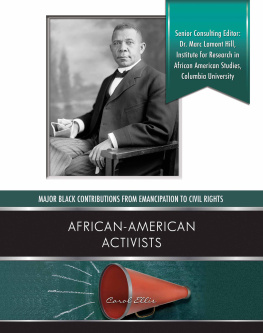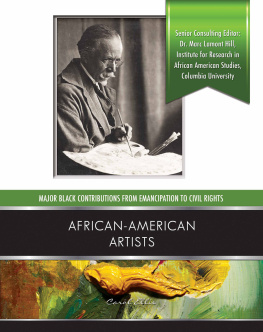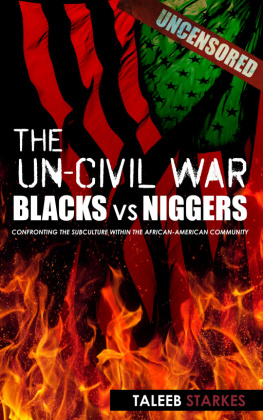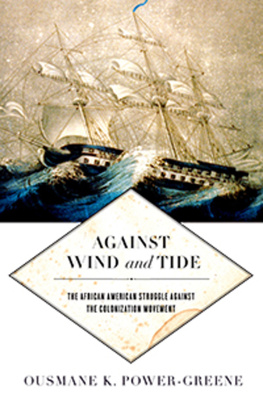
AFRICAN-AMERICAN
ACTIVISTS
CAROL ELLIS
TITLES IN THIS SERIES
AFRICAN-AMERICAN ACTIVISTS
AFRICAN-AMERICAN ARTISTS
AFRICAN-AMERICAN EDUCATORS
AFRICAN-AMERICAN MUSICIANS
AFRICAN-AMERICAN SCIENTISTS AND INVENTORS
AFRICAN-AMERICAN WRITERS AND JOURNALISTS
AFRICAN AMERICANS IN BUSINESS
AFRICAN AMERICANS IN LAW AND POLITICS
AFRICAN AMERICANS IN THE MILITARY
AFRICAN AMERICANS IN RADIO, FILM, AND TV ENTERTAINMENT
AFRICAN AMERICANS IN SPORTS
A HISTORY OF THE CIVIL RIGHTS MOVEMENT
AFRICAN-AMERICAN
ACTIVISTS

CAROL ELLIS

MASON CREST
PHILADELPHIA
 | Mason Crest
370 Reed Road, Suite 302
Broomall, PA 19008
www.MasonCrest.com |
Copyright 2013 by Mason Crest, an imprint of National Highlights, Inc.
All rights reserved. No part of this publication may be reproduced or transmitted in any form or by any means, electronic or mechanical, including photocopying, recording, taping, or any information storage and retrieval system, without permission from the publisher.
Printed and bound in the United States of America.
CPSIA Compliance Information: Batch #MBC2012-1. For further information, contact Mason Crest at 1-866-MCP-Book.
First printing
1 3 5 7 9 8 6 4 2
Library of Congress Cataloging-in-Publication Data
Ellis, Carol, 1945
African American activists / Carol Ellis.
p. cm. (Major Black contributions from emancipation to civil rights)
Includes bibliographical references.
ISBN 978-1-4222-2371-0 (hardcover)
ISBN 978-1-4222-2384-0 (pbk.)
1. African AmericansCivil rightsHistoryJuvenile literature. 2. African AmericansPolitics and governmentJuvenile literature. 3. Civil rights movementsUnited StatesHistoryJuvenile literature. 4. African American civil rights workersBiographyJuvenile literature. 5. African American political activistsBiographyJuvenile literature. 6. United StatesRace relationsHistoryJuvenile literature. I. Title.
E185.E395 2012
323.1196073dc23
2011051944
Publishers note: All quotations in this book are taken from original sources, and contain the spelling and grammatical inconsistencies of the original texts.
Picture credits: The George F. Landegger Collection of District of Columbia Photographs in Carol M. Highsmiths America, Library of Congress, Prints and Photographs Division: .
TABLE OF CONTENTS

Dr. Marc Lamont Hill
I t is impossible to tell the story of America without telling the story of Black Americans. From the struggle to end slavery, all the way to the election of the first Black president, the Black experience has been a window into Americas own movement toward becoming a more perfect union. Through the tragedies and triumphs of Blacks in America, we gain a more full understanding of our collective history and a richer appreciation of our collective journey. This book series, MAJOR BLACK CONTRIBUTIONS FROM EMANCIPATION TO CIVIL RIGHTS, spotlights that journey by showing the many ways that Black Americans have been a central part of our nations development.
In this series, we are reminded that Blacks were not merely objects of history, swept up in the winds of social and political inevitability. Rather, since the end of legal slavery, Black men and women have actively fought for their own rights and freedoms. It is through their courageous efforts (along with the efforts of allies of all races) that Blacks are able to enjoy ever increasing levels of inclusion in American democracy. Through this series, we learn the names and stories of some of the most important contributors to our democracy.
But this series goes far beyond the story of slavery to freedom. The books in this series also demonstrate the various contributions of Black Americans to the nations social, cultural, technological, and intellectual growth. While these books provide new and deeper insights into the lives and stories of familiar figures like Martin Luther King, Michael Jordan, and Oprah Winfrey, they also introduce readers to the contributions of countless heroes who have often been pushed to the margins of history. In reading this series, we are able to see that Blacks have been key contributors across every field of human endeavor.
Although this is a series about Black Americans, it is important and necessary reading for everyone. While readers of color will find enormous purpose and pride in uncovering the history of their ancestors, these books should also create similar sentiments among readers of all races and ethnicities. By understanding the rich and deep history of Blacks, a group often ignored or marginalized in history, we are reminded that everyone has a story. Everyone has a contribution. Everyone matters.
The insights of these books are necessary for creating deeper, richer, and more inclusive classrooms. More importantly, they remind us of the power and possibility of individuals of all races, places, and traditions. Such insights not only allow us to understand the past, but to create a more beautiful future.


Frederick Douglass (18181895) escaped from slavery to become a national figure who spoke and wrote eloquently about the injustice of slavery.
I t was the night of January 1, 1863. The United States was in the middle of the Civil War. Eleven southern states had seceded from the Union. They had formed a separate government called the Confederacy. The Federal government was fighting to bring the rebellious states back into the Union.
On that January night, hundreds of people crowded into the Tremont Temple in Boston, Massachusetts. Messengers waited between the church and the nearest telegraph office. They wanted to deliver the news as fast as they could.
We were waiting and listening as for a bolt from the sky, wrote an African American named Frederick Douglass. Eight, nine, ten oclock came and went, and still no word.
Six months earlier, President Abraham Lincoln had given the Confederate states a warning: surrender to the Union by January 1, or your slaves will be set free. But the Confederate states didnt give up. The bloody fighting didnt stop. Now New Years Day had arrived. Would Lincoln free the slaves?
Douglass waited anxiously with the rest of the people in the church. At last a man with hasty step advanced through the crowd, he wrote, and exclaimed in tones that thrilled all hearts, It is coming! It is on the wires!!
Next page













